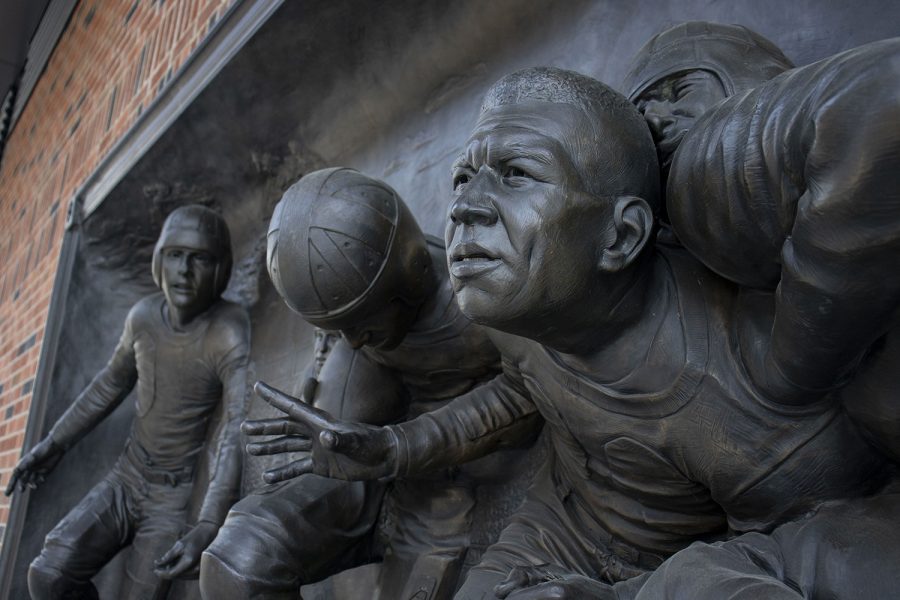Report: UI plans to name field at Kinnick Stadium after Duke Slater
Slater, who played football for the Hawkeyes from 1918-21, became the first Black athlete at Iowa to earn the distinction of first-team All-American.
A relief of former Iowa lineman Duke Slater is seen outside the north end zone of Kinnick Stadium on Sunday, July 5, 2020.
July 21, 2021
The playing field the Hawkeye football team swarms onto inside Kinnick Stadium may soon honor the first Black athlete at Iowa to earn first-team All-American honors.
The University of Iowa reportedly plans on naming the field at Kinnick Stadium after Duke Slater, according to a Wednesday report by The Associated Press. The state Board of Regents is set to consider and approve a “proposed facility naming” recommended by the university at a meeting next week, but no details about the agenda item have been released.
The UI has not yet confirmed the report, and a university spokesperson did not immediately respond to The Daily Iowan’s request for comment.
Slater played tackle at Iowa from 1918-21, earning first-team All-Big Ten honors in his final three seasons with the Hawkeyes. Slater earned first-team All-American honors in 1921, becoming the first Black player at Iowa to earn that distinction. In 1921, Slater helped the Hawkeyes achieve a 7-0 record, including a victory over Notre Dame that snapped the Fighting Irish’s 20-game winning streak.
As part of the 100th anniversary of Iowa football in 1989, Slater was named to Iowa’s all-time football team.
In 1951, Slater became one of five members of the inaugural Iowa Sports Hall of Fame and a member of the inaugural National Football Foundation College Football Hall of Fame.
After leaving Iowa, Slater became the NFL’s first Black lineman. The Clinton, Iowa, native played 10 professional seasons, earning All-Pro honors six times. In 1927 and 1929, Slater was the only Black player in the league.
Slater, who died in 1966 at age 67, will be inducted into the Pro Football Hall of Fame as part of the Centennial Class in August.
During his NFL offseasons, Slater took law classes at the UI, eventually earning a law degree from the UI in 1928. Slater served as a Chicago assistant district attorney in 1960, becoming the first Black member of the Chicago Superior Court.
Former UI President Willard “Sandy” Boyd proposed naming the university’s stadium Kinnick-Slater Stadium in the 1970s, as previously reported by The Daily Iowan. That proposal would have honored both Slater and Nile Kinnick, the 1939 Heisman Trophy winner who died during a training flight while serving in the U.S. Navy during World War II.
Boyd told The DI last summer the Campus Planning Committee rejected the proposal in 1972 because it claimed to disapprove of the hyphenation.
RELATED: Kinnick-Slater Stadium: A not-so-new name proposal
Iowa State’s Jack Trice Stadium is the only football stadium named after a Black player across the Power Five conferences.
Slater Residence Hall was the first building on the UI’s campus named for an African-American. It remains the only residence hall on campus named after a student-athlete. Slater, as a Black person, would not have been permitted to stay in the dorms during his time as a UI student, per university practices at the time.
The UI revealed a bronze statue honoring Slater outside Kinnick Stadium in 2019.
Last June, former Hawkeye football player James Daniels tweeted that there are “racial disparities” within the Iowa program, leading dozens of other Black former players to share the racism and mistreatment they alleged to have experienced with the Hawkeyes.
An investigation into the program’s culture by an outside law firm hired by the UI last summer found the program’s rules “perpetuated racial or cultural biases and diminished the value of cultural diversity,” and that the program over-monitored players to the point that they experienced heightened anxiety and maintained a culture that allowed a “small group of coaches” to demean players.
Strength coach Chris Doyle, the center of many of the allegations, reached a separation agreement with the UI before the investigation was completed. No other personnel changes were made to head coach Kirk Ferentz’s program related to the investigation.
A group of Black former players is suing the program for discrimination.



